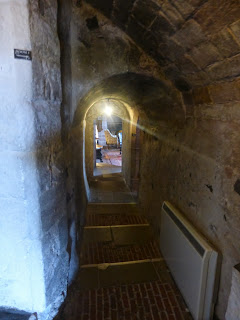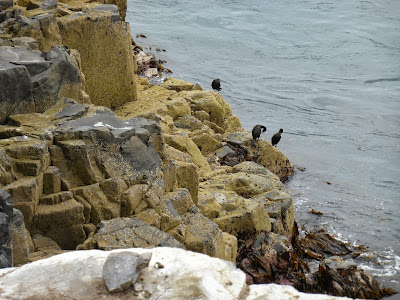This blog records my wanderings, achievements and disasters since retiring in 2011.
Monday, 30 September 2013
Sunday, 29 September 2013
Holy Island of Lindisfarne
I had always intended walking across the causeway to Holy Island so that I could visit Lindisfarne castle but as it was pouring down I decided to drive rather than walk the 3 miles across. You can only access the causeway at low tide which is about 6 -7 hours in every 24 so I was lucky as low tide was between 10am and 5pm.
 Whilst waiting for the tide to go out I stopped at an inlet and watched the curlews looking for food.
Whilst waiting for the tide to go out I stopped at an inlet and watched the curlews looking for food.
From the top of the castle you can see across to the Northumberland mainland and out over the North sea

Outside the castle, disused boats had been turned into sheds.
Close to the castle is a small garden protected from the harsh North easterly winds by a stone wall. The garden was designed by Gertrude Jekyll between 1906-1912.
Holy Island is regarded as the birthplace of Christianity in England. St Aidan founded a monastery here in the 7th cent with the priory built before the end of 634. The first monastery was destroyed by the Danes in the 9th cent but another was built again two hundred years later. Here are the ruins of the priory which look very impressive against the backdrop of the North sea.

In the 8th cent the famous illuminated manuscript known as the Lindisfarne Gospels was probably made here. It is the illustrated latin gospels of Matthew, Mark , Luke and John. In the 10th cent a monk named Aldred added an Old English translation of the latin text producing the earliest surviving English copy of the Gospels. The Lindisfarne Gospels are kept in the British Museum in London although many think they should be kept closer to where they originated.

There were a number of lobster pots that had been washed up on the shore.
 Whilst waiting for the tide to go out I stopped at an inlet and watched the curlews looking for food.
Whilst waiting for the tide to go out I stopped at an inlet and watched the curlews looking for food.
From the top of the castle you can see across to the Northumberland mainland and out over the North sea

Close to the castle is a small garden protected from the harsh North easterly winds by a stone wall. The garden was designed by Gertrude Jekyll between 1906-1912.
Holy Island is regarded as the birthplace of Christianity in England. St Aidan founded a monastery here in the 7th cent with the priory built before the end of 634. The first monastery was destroyed by the Danes in the 9th cent but another was built again two hundred years later. Here are the ruins of the priory which look very impressive against the backdrop of the North sea.

In the 8th cent the famous illuminated manuscript known as the Lindisfarne Gospels was probably made here. It is the illustrated latin gospels of Matthew, Mark , Luke and John. In the 10th cent a monk named Aldred added an Old English translation of the latin text producing the earliest surviving English copy of the Gospels. The Lindisfarne Gospels are kept in the British Museum in London although many think they should be kept closer to where they originated.
Before leaving the Island I took one last walk along the pebbled beach by the small harbour.

There were a number of lobster pots that had been washed up on the shore.
Friday, 27 September 2013
The Willis building
Loved the architecture of this office block in the heart of the city of London.
At the front of the building is a number sculpture entitled 'One through Zero' by Robert Indiana. They stand out against the black and grey buildings that surround them.
Sharing with Weekend reflections and
Sharing with Weekend reflections and
Thursday, 26 September 2013
Tuesday, 24 September 2013
Inner Farne Island
Whilst in Northumberland I took a boat trip to the Inner Farne Island. We spent about an hour wandering around the small island. All the nesting sea birds had long since flown. But on a rocky crag there was one solitary nest with 2 young shags still to take flight, perhaps they were enjoying the limelight just too much.
Sharing with Wild bird wednesday
Sharing with Wild bird wednesday
Monday, 23 September 2013
Barter bookshop in Alnwick
This disused railway station in Alnwick, Northumberland, has been converted into one of the largest 2nd hand book shops in Britain.
Lines of poetry and a model railway link the cases of books.
I could have spent hours and hours browsing through the shelves and I'm sure if I lived nearby I probably would. There is also a cafe, serving delicious food, which is where I met up with a friend of mine, who now lives in Hexham.
This mural of well known writers brightens up what used to be a plain wall.
Sharing with 'Our World Tuseday'
Lines of poetry and a model railway link the cases of books.
I could have spent hours and hours browsing through the shelves and I'm sure if I lived nearby I probably would. There is also a cafe, serving delicious food, which is where I met up with a friend of mine, who now lives in Hexham.
This mural of well known writers brightens up what used to be a plain wall.
Sharing with 'Our World Tuseday'
Thursday, 19 September 2013
The Farne Islands
The Farne Islands lie a couple of miles off the Northumberland coast and are managed by the National Trust. In the Spring it is said there are 23 different species of seabird nesting on the islands. I visited in September long after the birds had flown but I was still able to see many of the large grey seals which breed here in the Autumn.
Subscribe to:
Posts (Atom)
































.jpg)















